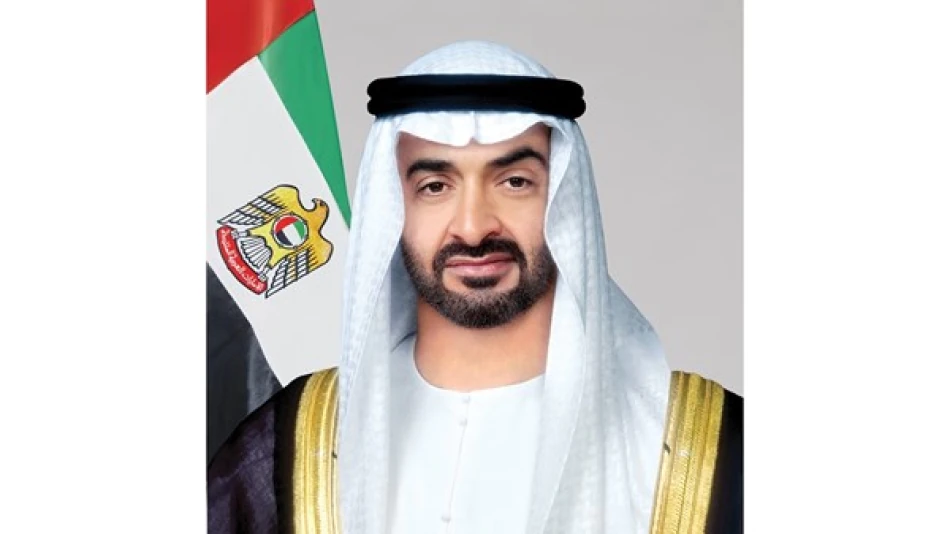
UAE President and Turkish Leader Vow to Strengthen Bilateral Ties at Inaugural Strategic Committee Meeting
UAE-Turkey Strategic Partnership Deepens as Leaders Launch High-Level Cooperation Framework
The UAE and Turkey have formalized their evolving relationship through the inaugural meeting of a new Strategic High Committee, signaling a significant shift in Middle Eastern diplomatic alignments. The framework, launched during UAE President Sheikh Mohammed bin Zayed Al Nahyan's state visit to Ankara, positions both nations to capitalize on emerging economic opportunities while pursuing coordinated regional diplomacy.
Economic Cooperation Takes Center Stage
The presidential meeting at Ankara's Presidential Palace focused heavily on expanding collaboration across key growth sectors including technology, renewable energy, food security, and advanced manufacturing. This emphasis reflects both countries' strategic pivot toward economic diversification and technological advancement as they prepare for the post-oil era.
The comprehensive economic partnership between the UAE and Turkey has already shown promising results, with bilateral trade volumes steadily increasing over recent years. Turkey's manufacturing capabilities complement the UAE's position as a regional financial and logistics hub, creating natural synergies for deeper integration.
Technology and Innovation Drive Future Growth
The presence of UAE Minister of Industry and Advanced Technology Dr. Sultan Al Jaber in the delegation underscores the importance both nations place on technological cooperation. This focus aligns with global trends where middle powers are forming strategic partnerships to compete in emerging technologies, similar to partnerships between Singapore and Israel or South Korea and the UAE.
Regional Diplomacy and Security Coordination
Beyond economic ties, the Strategic High Committee represents a significant diplomatic development in Middle Eastern geopolitics. Both leaders emphasized their commitment to diplomatic solutions for regional crises, positioning themselves as moderate voices advocating for stability and dialogue.
This approach reflects a broader regional trend where Gulf states are pursuing pragmatic diplomacy with traditional rivals. The UAE's normalization with Israel through the Abraham Accords and its recent diplomatic engagement with Iran demonstrate this flexible approach, while Turkey has similarly recalibrated its regional relationships.
Implications for Regional Power Dynamics
The UAE-Turkey partnership could reshape regional alliances, particularly as both nations seek to balance relationships with major powers including the United States, Russia, and China. Their emphasis on "mutual respect" and shared prosperity suggests a model that other regional partners might emulate.
Investment and Market Opportunities
For international investors, the deepening UAE-Turkey partnership opens new corridors for trade and investment. Turkey's strategic location bridging Europe and Asia, combined with the UAE's role as a gateway to Africa and South Asia, creates expanded market access opportunities.
The involvement of UAE Investment Minister Mohammed Hassan Al Suwaidi signals potential for significant capital flows between the two nations. Turkish companies could benefit from UAE sovereign wealth fund investments, while Emirati businesses gain access to Turkey's manufacturing base and European market connections.
Looking Forward: A New Model for Regional Cooperation
The Strategic High Committee represents more than bilateral cooperation—it demonstrates how middle powers can forge independent partnerships that serve their national interests while contributing to regional stability. This pragmatic approach to diplomacy, prioritizing economic development and peaceful conflict resolution, may become increasingly relevant as global power structures continue to evolve.
The success of this partnership will likely influence other regional relationships and could encourage similar frameworks between other Middle Eastern nations seeking to balance economic growth with geopolitical stability. As both countries continue diversifying their economies and international partnerships, their collaboration serves as a template for constructive regional engagement in an increasingly multipolar world.
Most Viewed News

 Layla Al Mansoori
Layla Al Mansoori






